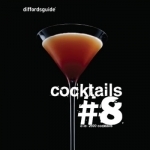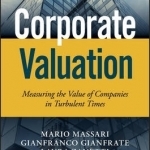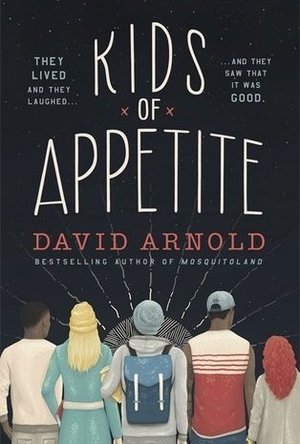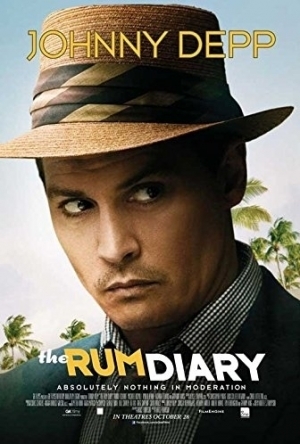
Diffords Cocktails #8 HD
Lifestyle and Entertainment
App
Cocktails #8 is the top drinks app according to 'The Sunday Times App list', their definitive guide...

JKZ Series1
Health & Fitness
App
Dr Jon Kabat-Zinn’s Series 1 – NOW available as an app! The Series 1 mindfulness meditation app...

GPS Navigation & Offline Maps
Navigation and Travel
App
(scroll down for english summary) *** Upozornění: Uživatelé starší verze (Be-on-road) mohou...
Hazel (1853 KP) rated Kids of Appetite in Books
Dec 14, 2018
They lived and they laughed and they saw that it was good.</i>
<i>Mosquitoland </i>was the best book I read last year (2015) and I was excited to discover what David Arnold would write next. I approached<i> Kids of Appetite</i> with mild trepidation; what if it did not live up to my expectations? Need not have worried – it was brilliant. Dubbed a “tragicomedy” <i>Kids of Appetite</i> is a combination of realistic, heartbreaking experiences with intellectual humour.
The book opens mid interview at a local police station where two teenagers, Vic and Mad, are being questioned about a murder their friend has supposedly committed. From there, the story backtracks a week and proceeds to bring the reader up to date. It all begins with Vic running away from home, distancing himself from his mother and her new partner. By chance, a coincidence – a bump, Vic would say – he is found by Mad who introduces him to a small group of homeless friends. Vic may not have packed in preparation for life on the streets – or in a greenhouse as it turns out – however he did grab the urn containing his late father’s ashes before racing out of the house. Along with the urn is a letter containing cryptic clues that lead to various locations that Vic’s father wished for his ashes to be scattered. He, along with his new found friends; make it a mission to put his father to rest.
It is not possible to label the general theme of the book. <i>Kids of Appetite</i> is a story full of stories. Each character has their own past, something that led them to the situation they find themselves in now. The group consists of five members – once Vic has been accepted. Baz, at age twenty-seven, is clearly the leader: responsible, caring, and fatherly – until accused of murder. Seven years younger is Zuz, Baz’s mute brother, and finally Coco, an eleven year old with the mouth of a foul old lady. It is Coco, amongst all her swearing and hilarious misuse of words, that coins the name <i>Kids of Appetite, KOA</i> for short, a play on words: they are not solely in want of food, they hunger for life.
Initially it would appear that the main focus will be on Vic: his father’s death, his mother’s new partner, Moebius (facial paralysis) – a syndrome that results in a lot of bullying and discrimination – and, of course, his flight from home. However the remaining members of <i>KOA </i>equally contribute to the overall narrative. Mad, like Vic, knows what it is like to lose a father. Unfortunately she also knows what it is like to lose a mother. Her life since the fateful car crash that left her and orphan has been full of abuse and uncertainty. Baz and Zuz, on the other hand, have escaped a traumatizing childhood in the midst of the Congo Civil War.
Similarly with <i>Mosquitoland</i>, Arnold’s second book is full of intellectual knowledge and humour complete with references to highbrow material. Vic is obsessed with an operatic song and deeply interested in abstract art, particularly Matisse. He pulls the artist’s work apart in search of meaning and relatable truths of life. Like Vic, Mad has a particular song she draws comfort from. The lyrics help her make sense of the world around her, and produce her own manifesto – Madifesto, rather. She is particularly fascinated by S E Hinton’s <i>The Outsiders</i> – a book I have not read, but am obviously going to now. With in-depth theories purloined from her favourite novel, she encourages and advises those around her.
The murder investigation is evidently another key point of the book. I do not want to say too much on the matter as it would not be fair to give the ending away. Be reassured that<i> Kids of Appetite</i> is not a thriller, crime or horror novel; it is the events and dialogue leading up to the conclusion that make up the greatest parts of the story.
It is essentially the characters that make <i>Kids of Appetite</i> such a fantastic work of fiction. Their background stories are all based on real life experiences of many people throughout the world, but it is their opinion of life, their terminology, and their reckless enthusiasm that really impacts the reader. <i>Kids of Appetite</i> is a book to be read over and over again. So many phrases can be lifted and quoted to explain our own lives and feelings. In fact, the entire novel is one big quote to sum up life itself. Although there are so many themes, stories and ideas, there is one clear message. Let go. Let go of the past. Let go of the things that hold you back. For Vic and Mad it is the death of their parents; for Coco it is abandonment; and Baz and Zuz learn to let go of their violent childhood.
David Arnold is an extremely talented author, seamlessly flowing from one notion to another, whilst sweeping the reader into a sea of pure emotion. He may over use the word “ergo” and have an unconventional penchant for ellipses, but that only adds to the uniqueness of the writing. There may be an excessive amount of expletives, however that is overshadowed by the pure genius of the story itself. <i>Kids of Appetite</i> is a book I want to recommend to all. The blurb likens it to authors Rainbow Rowell and Jennifer Niven – I would like to throw John Green into the mix – and should appeal to many Young Adult readers. I could write forever about this book, but I would rather you go and read it yourself. And whilst you read, remember:
<i>They lived and they laughed and they saw that it was good. </i>
Gareth von Kallenbach (980 KP) rated The Rum Diary (2011) in Movies
Aug 7, 2019
The Rum Diary follows Paul Kemp (played by Johnny Depp), a failed novelist turn journalist, who finds himself at a critical turning point in his life. Having written two and a half novels that were never published, he was having trouble finding his voice, in that he needed to find a way to “write like him” as Paul put it himself. So he decides to do some freelance writing for a small publication located in San Juan, Puerto Rico in 1960.
The movie opens with Kemp waking up in a hotel, and you can immediately, and clearly, see that he partakes in certain pleasures of life. After reporting to work at San Juan Star, Kemp meets Sala (played by Michael Rispoli), the photographer for the Star who quickly becomes his cohort. The editor-in-chief of the San Juan Star, Lotterman (played by Richard Jenkins) indicates to Kemp that the publication is only a few months away from being closed down, and that there really isn’t much to look forward to. He assigns Kemp to do some fluff pieces and the horoscope section of the paper.
Kemp is not content with this as he is looking at this experience as a way to put his career back on track. Over the next few days, during his adventures with Sala, he comes across a few different story ideas that are immediately shot down by Lotterman, as they emphasize the things that are wrong with San Juan, and Lotterman feels that the focus should be on the good things (like bowling alleys).
During one of his nights of boozing, he meets Chenault (played by Amber Heard). She’s aloof, mysterious, and of course… Kemp falls immediately in love with her. She just happens to be the girlfriend of Sanderson (played by Aaron Eckhart). Sanderson immediately recognizes the talents that Kemp has and begins recruiting him for a real estate scam. The idea is to get a foothold and build a new hotel on a private island that is used for United States military testing, but will soon be relinquished from that purpose. Sanderson and a group of investors want Kemp to put a brilliant positive spin on the hotel investment so that the public opinion, and that of those in a position to block the development, is a positive one.
Things begin to unravel as Kemp and Sala’s shenanigans keep getting them into trouble, culminating in a heated night where Kemp, Sala, Chenault and Sanderson end up at a bar during the St. Thomas Carnival.
The Rum Diary was highly entertaining with a great supporting cast. Giovani Ribisi provides an excellent distraction from some of the more serious events of the movie as he appears every now and then as Moburg, another reporter for the San Juan Star. The movie played like a great alcohol-induced, drug-fueled adventures of a journalist in the 1960s. Definitely some quirky moments, and you will find yourself laughing at many of Kemp and Sala’s exploits.
My only gripe with the movie is how it ended. The build up to Kemp printing the story and putting it out there leaves you wanting more. While I don’t think the film will reach the same cult-status that Fear and Loathing in Las Vegas will, it is definitely entertaining (all the way until the end). It is a good nod to Thompson and fans of his books and movie adaptations are sure to enjoy.

Corporate Valuation: Measuring the Value of Companies in Turbulent Times
Mario Massari, Gianfranco Gianfrate and Laura Zanetti
Book
Risk consideration is central to more accurate post-crisis valuation Corporate Valuation presents...

Dignaga's Investigation of the Percept: A Philosophical Legacy in India and Tibet
Douglas Duckworth, Malcolm David Eckel, Jay L Garfield and John Powers
Book
Investigation of the Percept is a short (eight verses and a three page autocommentary) work that...
The Investment Paradox: Why Boring Stocks Make Interesting Investments
Pim Van Vliet and Jan de Koning
Book
Believing "high-risk equals high-reward" is holding your portfolio hostage High Returns from Low...

Mountain Walking in Snowdonia: 40 of the Finest Routes in Snowdonia
Book
This guidebook describes 40 day walks exploring Snowdonia. It showcases some of the best mountain...

The Language of Landscape
Book
This eloquent and powerful book combines poetry and pragmatism to teach the language of landscape....


